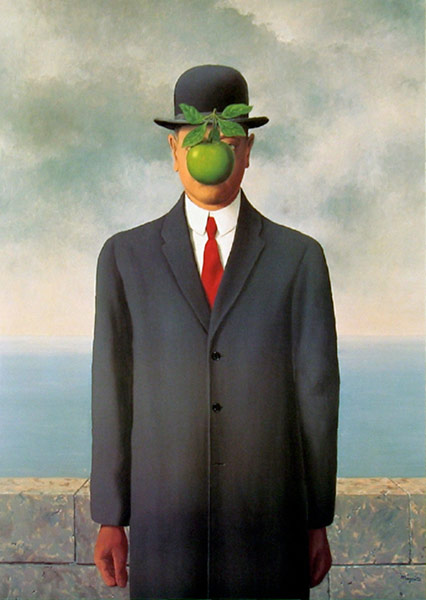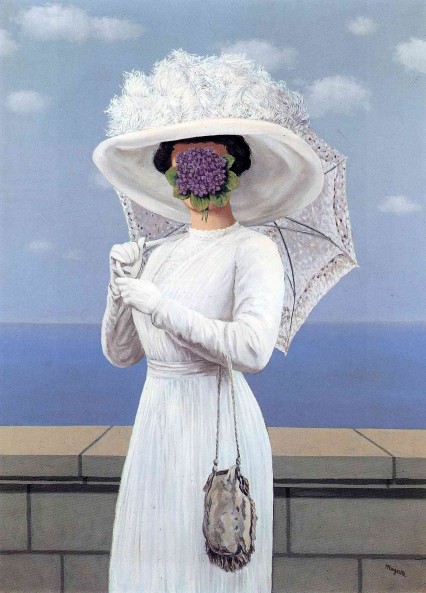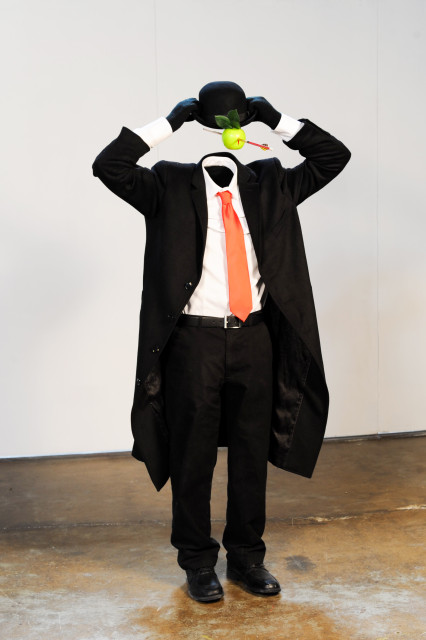René Magritte
‚The Son of Man‘
Key Piece
The Son Of Man is an iconic picture of the mid 20th century by Belgium surrealist artist René Magritte. Here are ten facts about the painting in our Key Piece series.
1. It is a self-portrait of the artist himself painted in 1964.
2. It contains many of Magritte’s symbols such as an apple, reference to his Ceci n’est pas une pomme or a bowler hat as seen in Man in a Bowler Hat.
3. It appears to be the man pendant of Magritte’s painting The Great War on Façades that represent a woman with her face covered with flower instead of an apple. Both characters from The Son of Man and The Great War on Façades are standing in front of the same landscape, thus making of both painting a couple.
4. The title refers to a long lasting tradition that began in the Medieval Age. It is mentioned in Christian writings such as the Gospels in reference to Jesus. Throughout the centuries, the appellation has been used by several painters such as Titian to name a Christ painting. Magritte therefore offer his own representation of the subject.
5. Some peculiar details are clear references to Surrealism; such as the left arm bending backward.
6. For Magritte it is a depiction of the humanity itself given that: ‘Everything we see hides another thing, we always want to see what is hidden by what we see. There is an interest in that which is hidden and which the visible does not show us.’
7. The painting is private hands and rarely goes to public shows.
8. The Son of Man is a great reference for popular culture. It is even featured in the The Simpsons episode ‘Treehouse of Horror IV’.
9. It is also a big inspiration for other artists. American artist Mark Jenkins created his own version of The Son of Man in his REMIX exhibition.
10. It is the main reference used in the American film Thomas Crown Affair to portray ’the stereotypical faceless businessman’.

René Magritte, 1964, Oil on canvas. 116 cm × 89 cm (45.67 in × 35 in)

René Magritte, 1964, Oil on canvas

Mark Jenkins, 2016 from his REMIX exhibition at Arsenal Contemporary Art
Archive
- Dezember 2016 (1)
- Oktober 2016 (3)
- September 2016 (24)
- Juli 2016 (20)
- Juni 2016 (24)
- Mai 2016 (18)
- April 2016 (18)
- März 2016 (21)
- Februar 2016 (11)
- Januar 2016 (20)
- Dezember 2015 (20)
- November 2015 (37)
- Oktober 2015 (30)
- September 2015 (24)
- August 2015 (4)
- Juli 2015 (30)
- Juni 2015 (9)
- Mai 2015 (17)
- April 2015 (23)
- März 2015 (18)
- Januar 2015 (8)
- Dezember 2014 (1)
- November 2014 (3)
- Oktober 2014 (10)
- September 2014 (4)
- August 2014 (2)
- Juli 2014 (3)
- Juni 2014 (2)
- Mai 2014 (5)
- April 2014 (11)
- März 2014 (12)
- Februar 2014 (13)
- Januar 2014 (10)
- Dezember 2013 (5)
- November 2013 (13)
- Oktober 2013 (24)
- September 2013 (18)
- August 2013 (26)
- Juli 2013 (13)
- Juni 2013 (35)
- Mai 2013 (44)
- April 2013 (49)
- März 2013 (61)
- Februar 2013 (54)
- Januar 2013 (46)
- Dezember 2012 (50)
- November 2012 (58)
- Oktober 2012 (62)
- September 2012 (61)
- August 2012 (63)
- Juli 2012 (64)
- Juni 2012 (61)
- Mai 2012 (63)
- April 2012 (51)
- März 2012 (67)
- Februar 2012 (37)



